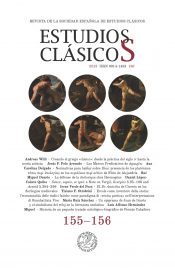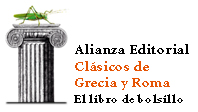Creando el griego «clásico»: desde la práctica del siglo IV hasta la teoría aticista
Creating ‘Classical’ Greek: from fourth- century practice to Atticist theory
Creating ‘Classical’ Greek: from fourth- century practice to Atticist theory
Andreas Willi
Universidad de Oxford
Andreas Willi (1972, Altstätten, Suiza) se formó en Filología griega, latina y eslava, así como en Lingüística comparada del indoeuropeo en las universidades de Basilea, Lausana, Michigan y Friburgo. Obtuvo su doctorado en la Universidad de Oxford con una tesis sobre la variación lingüística en ático clásico bajo la dirección de la profesora Anna Morpurgo Davies (The Languages of Aristophanes, Oxford, University Press, 2003). Realizó después su trabajo de habilitación en la universidad de Basilea, investigando sobre la interacción entre lengua, literatura y sociedad en la Sicilia griega (Sikelismos: Sprache, Literatur und Gesellschaft im griechischen Sizilien, Basilea, Schwabe, 2008). Desde enero de 2005 es Diebold Professor de Filología Comparada en la Universidad de Oxford y fellow del Worcester College. Sus publicaciones incluyen numerosos trabajos sobre la relación entre lengua y cultura en el mundo antiguo, por un lado, y sobre gramática comparada del griego, el latín y el indoeuropeo. En este último campo acaba de publicar una amplia monografía sobre la prehistoria indoeuropea del sistema verbal del griego (Origins of the Greek Verb, Cambridge, University Press, 2018). El Prof. Willi es editor de la revista Glotta: Zeitschrift für griechische und lateinische Philologie y ha editado varios volúmenes colectivos, entre los que se incluyen The Language of Greek Comedy (Oxford, University Press, 2002), Laws and Rules in Indo-European (junto con P. Probert, Oxford, University Press, 2012), and Formes et fonctions des langues littéraires en Grèce ancienne (Ginebra, Fondation Hardt, 2019).
Resumen
Aunque es ampliamente usada, la noción de griego «clásico» no se define con precisión fácilmente, pues criterios de sociolecto, dialecto y cronología interactúan en su especificación. A primera vista, uno podría atribuir a los gramáticos aticistas del s. I d.C. la responsabilidad de la «clasificación» de la particular variedad de griego así descrita. Sin embargo, en realidad, lo que hicieron todos los aticistas fue codificar un desarrollo que había comenzado mucho antes, durante las primeras décadas del s. IV a.C., cuando los primeros autores no atenienses escogen escribir en ático contemporáneo. Mientras al principio el griego «clásico» se había opuesto sincrónicamente (horizontalmente) al griego «no clásico», a través del tiempo esta oposición se transformó en una oposición diacrónica (vertical); con todo, la elección del objetivo en sí misma no se vio afectada por este cambio de perspectiva.
Palabras clave: griego ático; aticismo; griego clásico; papiro de Derveni; dialectos literarios griegos
Abstract
Although it is widely used, the notion of ‘classical’ Greek is not easily defined with precision, since sociolectal, dialectal, and chronological criteria interact in its specification. At first sight, one might hold the Atticist grammarians of the first centuries ad responsible for the ‘classicisation’ of the particular variety of Greek thus labelled. In reality, however, all the Atticists codified a development that had begun much earlier, during the initial decades of the 4th c. BC, when non-Athenian authors first chose to write in contemporary Attic. Whereas ‘classical’ Greek had thus been synchronically (horizontally) opposed to ‘non-classical Greek at the outset, this opposition turned into a diachronic (vertical) one over time; but the selection of the target variety itself remained unaffected by this change in perspective.
Keywords: Attic Greek; Atticism; classical Greek; Derveni papyrus; Greek literary dialects
Referencias bibliográficas
AX, W. (1990) «Aristophanes von Byzanz als Analogist: Zu Fragment 374 Slater (= Varro, de lingua Latina 9, 12)», Glotta 68, 4–18.
Betegh, G. (2004) The Derveni papyrus: cosmology, theology and interpretation, Cambridge.
Bile, M. (2001) «La prose dorienne», en R. Hodot (dir.) La koiné grecque antique. iv, Les koinés littéraires, Nancy, 115–134.
Broggiato, M. (2000) «Athenaeus, Crates and Attic glosses: a problem of attribu- tion», en D. Braund and J. Wilkins (eds.) Athenaeus and his world: reading Greek culture in the Roman empire, Exeter, 364–371 y 578–580.
— (2001) Cratete di Mallo. I frammenti, La Spezia (= Roma, 2006).
Bubeník, V. (1989) Hellenistic and Roman Greece as a sociolinguistic area, Ámsterdam (Philadelphia)
Burkert, W. (1986) «Der Autor von Derveni», ZPE 62, 1–5.
Callanan, C. K. (1987) Die Sprachbeschreibung bei Aristophanes von Byzanz, Gotinga. Cassio, A. C. (1986) «Continuità e riprese arcaizzanti nell’uso epigrafico dei dialetti greci: il caso dell’eolico d’Asia», AION(ling.) 8, 131–146.
— (1989) «Lo sviluppo della prosa dorica e le tradizioni occidentali della retorica greca», en A. C. Cassio & D. Musti (eds.) Tra Sicilia e Magna Grecia. Aspetti di interazione culturale nel IV sec. a.C. Atti del Convegno Napoli, 19–20 marzo 1987, Nápoles, 137–156.
— (1996) «La prose ionienne postclassique et la culture de l’Asie Mineure à l’époque hellénistique», en C. Brixhe (ed.) La koiné grecque antique. II, La concurrence, Nancy / París, 147–170.
Consani, C. (1991) Διάλεκτος. Contributo alla storia del concetto di «dialetto», Pisa.
— (1993) «La koiné et les dialectes grecs dans la documentation linguistique et la réflexion métalinguistique des premiers siècles de notre ère», en C. Brixhe (ed.) La koiné grecque antique. I, Une langue introuvable?, Nancy, 23–39.
— (1996) «Koinai et koiné dans la documentation épigraphique de l’Italie méridionale», en C. Brixhe (ed.) La koiné grecque antique. II, La concurrence, Nancy / París,113–132.
Cribiore, R. (2001) Gymnastics of the mind: Greek education in Hellenistic and Roman Egypt, Princeton / Oxford.
Debrunner, A. (1954) Geschichte der griechischen Sprache. II, Grundfragen und Grundzüge des nachklassischen Griechisch, Berlín.
DittenBerger, W. (1897) «Antiphons Tetralogien und das attische Criminalrecht. ii», Hermes 32, 1–41.
Dihle, A. (1977) «Der Beginn des Attizismus», A&A 23, 162–177.
Dover, K. (1950) «The chronology of Antiphon’s speeches», CQ 44, 44–60.
Van der Eijk, P. J. (1997) «Towards a rhetoric of ancient scientific discourse: some formal characteristics of Greek medical and philosophical texts (Hippocratic Corpus, Aristotle)», en E. J. Bakker (ed.) Grammar as interpretation: Greek literature in its linguistic contexts, Leiden / Nueva York / Colonia, 77–129.
Ferguson, C. (1959) «Diglossia», Word 15, 325–340.
Fischer, E. (1974) Die Ekloge des Phrynichos, Berlín / Nueva York.
Frösén, J. (1974) Prolegomena to a study of the Greek language in the first centuries AD: the problem of Koiné and Atticism, Helsinki.
Funghi, M. S. (1997) «The Derveni papyrus», en A. Laks & G. W. Most (eds.) Studies on the Derveni papyrus, Oxford, 25–37.
Gautier, L. (1911) La langue de Xénophon, Ginebra.
Gelzer, T. (1979) «Klassizismus, Attizismus und Asianismus», en H. Flashar (ed.) Le classicisme à Rome aux Iers siècles avant et après J.-C., Ginebra, 1–41.
Van Groningen, B. A. (1938), «Le vocabulaire d’Enée le Tacticien», Mnemosyne ser. iii, 6, 329–334.
Hainsworth, J. B. (1967) «Greek views of Greek dialectology», TPhS 66, 62–76.
Hodot, R. (1990) Le dialecte éolien d’Asie. La langue des inscriptions VIIᵉ s. a.C.–IVᵉ s.p.C., París.
Horrocks, G. (2010²) Greek: a history of the language and its speakers, Chichester.
Hunter, L. W. & Handford, S. A. (1927) Aeneas: On siegecraft, Oxford.
Janko, R. (1997) «The physicist as hierophant: Aristophanes, Socrates and the authorship of the Derveni papyrus», ZPE 118, 61–94.
— (2001) «The Derveni papyrus (Diagoras of Melos, Apopyrgizontes Logoi?): a new translation», CPh 96, 1–32.
Kahn, C. H. (1997) «Was Euthyphro the author of the Derveni Papyrus?», en A. Laks & G. W. Most (eds.) Studies on the Derveni papyrus, Oxford, 55–63.
Kim, L. (2010) «The literary heritage as language: Atticism and the Second Sophistic», en E. J. Bakker (ed.) A companion to the ancient Greek language, Chichester, 468–482.
Lallot, J. (2011) «Did the Alexandrian grammarians have a sense of history?», en S. Matthaios, F. Montanari & A. Rengakos, Ancient scholarship and grammar: archetypes, concepts and contexts, Berlín / Nueva York, 241–250.
Latte, K. (1915) «Zur Zeitbestimmung des Antiatticista», Hermes 50, 373–394.
— (1925) «Glossographika», Philologus 80, 136–175.
Lobeck, C. A. (1820) Phrynichi eclogae nominum et verborum Atticorum, Leipzig.
López Eire, A. (1991) Ático, koiné y aticismo. Estudios sobre Aristófanes y Libanio, Murcia.
— (1993) «De l’attique à la koiné», en C. Brixhe (ed.) La koiné grecque antique. I, Une langue introuvable?, Nancy, 41–57.
— (1996) «L’influence de l’ionien-attique sur les autres dialectes épigraphiques et l’origine de la koiné», en C. Brixhe (ed.) La koiné grecque antique. II, La concurrence, Nancy / París, 7–42.
Maidhof, A. (1912) «Zur Begriffsbestimmung der Koine, besonders auf Grund des Attizisten Moiris», en A. Dyroff (ed.) Festgabe für Martin von Schanz zur 70. Geburtstagsfeier (12. Juni 1912): in Dankbarkeit überreicht von ehemaligen Schülern (=Beiträge zur historischen Syntax der griechischen Sprache, xx), Wurzburgo, 277–373.
Morpurgo Davies, A. (2002) «The Greek notion of dialect», en T. Harrison (ed.) Greeks and barbarians, Edimburgo 153–171 (= Verbum 10 [1987] 7–27).
Naechster, M. (1908) De Pollucis et Phrynichi controversiis, tesis doctoral, Leipzig.
Niehoff-Panagiotidis, J. (1994) Koine und Diglossie, Wiesbaden.
Pfeiffer, R. (1968) History of classical scholarship from the beginnings to the end of the Hellenistic age, Oxford.
— (1976) History of classical scholarship 1300–1850, Oxford.
Powell, J. E. (1938) A lexicon to Herodotus, Cambridge.
Probert, P. (2011) «Attic irregularities: their reinterpretation in the light of Atticism», en S. Matthaios, F. Montanari & A. Rengakos (eds.) Ancient scholarship and grammar: archetypes, concepts and contexts, Berlín / Nueva York, 269–290.
Radermacher, L. (1899) «Studien zur Geschichte der antiken Rhetorik. iV, Über die Anfänge des Atticismus», RhM 54, 351–374.
Rosenkranz, B. (1930) «Der lokale Grundton und die persönliche Eigenart in der Sprache des Thukydides und der älteren attischen Redner», IF 48, 127–178.
Rydbeck, L. (1967) Fachprosa, vermeintliche Volkssprache und Neues Testament. Zur Be- urteilung der sprachlichen Niveauunterschiede im nachklassischen Griechisch, Uppsala.
Schmid, W. (1887–1897) Der Atticismus in seinen Hauptvertretern von Dionysius von Halikarnass bis auf den zweiten Philostratus, I– V, Stuttgart.
Schwyzer, E (1939) Griechische Grammatik. I, Allgemeiner Teil, Lautlehre, Wortbildung, Flexion, Múnich.
Siebenborn, E. (1976) Die Lehre von der Sprachrichtigkeit und ihren Kriterien. Studien zur antiken normativen Grammatik, Ámsterdam.
Slater, W. (1977) «Review of Fischer 1974», Gnomon 49, 258–262.
Sluiter, I. (1990) Ancient grammar in context: contributions to the study of ancient linguistic thought, Ámsterdam.
Swain, S. (1996) Hellenism and empire: language, classicism, and power in the Greek world AD 50–250, Oxford.
Teodorsson, S. T. (1977) The phonology of Ptolemaic Koine, Gotemburgo.
Thesleff, H. (1961) An introduction to the Pythagorean writings of the Hellenistic period, Åbo.
Threatte, L. (1996) The grammar of Attic inscriptions. II, Morphology, Berlín / Nueva York.
ThumB, A. (1901) Die griechische Sprache im Zeitalter des Hellenismus. Beiträge zur Geschichte und Beurteilung der κοινή, Estrasburgo.
ThumB, A. & Kieckers, E. (19322) Handbuch der griechischen Dialekte. I, Heidelberg.
ThumB, A. & Scherer, A. (19592) Handbuch der griechischen Dialekte. II, Heidelberg.
Tsantsanoglou, K. & Kouremenos, Th. (2006) «Introduction», en Th. Kouremenos, G. M. Parássoglou & K. Tsantsanoglou (eds.) The Derveni papyrus, Florencia, 1–59.
Versteegh, K. (1986) «Latinitas, Hellenismos, ‘Arabiyya», Historiographia Linguistica 13, 425–448.
Vessella, C (2008) «La prosa», en A. C. Cassio (ed.) Storia delle lingue letterarie greche, Florencia, 292–320.
West, M. L. (1983) The Orphic poems, Oxford.
Whitmarsh, T. (2005) The Second Sophistic, Oxford.
Willi, A. (2003) «New language for a new comedy: a linguistic approach to Aristophanes’ Plutus», PCPhS 49, 40–73.
— (2010) «Attic as the language of the Classics», en C. C. Caragounis (ed.) Greek: a language in evolution. Essays in honour of Antonios N. Jannaris, Hildesheim / Zurich / Nueva York, 101–118.
Wisse, J. (1995) «Greeks, Romans, and the rise of Atticism», en J. G. J. Abbenes, S. R. Slings & I. Sluiter (eds.) Greek literary theory after Aristotle: a collection of papers in honour of D. M. Schenkeveld, Ámsterdam, 65–82.
Revista
-
Sobre la revista
Página principal
-
Estatutos
Estatutos de la Revista Estudios Clásicos
-
Código ético
Declaración de buenas prácticas
-
Normas de recepción y envío
Indicaciones para envíos de artículos
-
Equipo editorial
Consejos de redacción y asesor
-
Comité de honor
Comité de honor
Información
-
Para autores
Publicar con nosotros
-
Para evaluadores
Normas para evaluar artículos
-
Para bibliotecas
Información bibliográfica
-
Contacto
Cuestiones y preguntas
Publicar en EClás
-
Envío de originales
Artículos y reseñas
-
Normas de publicación
Descarga normas en PDF
-
Estilo CSL EClás
Estilo CSL EClás
-
Índices de calidad
Bases de datos e impactos


 c/ Serrano, 107
c/ Serrano, 107